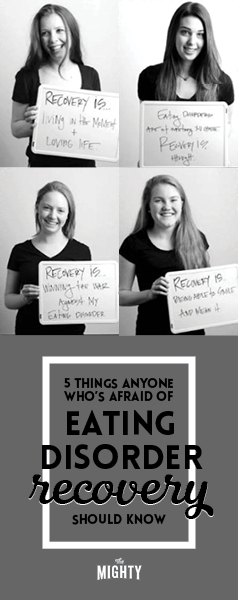I am committed to helping people fully recover from eating disorders. As the co-founder and co-director of Project HEAL, I spend my days ensuring that more people have access to life-saving treatment, and spreading hope that recovery is possible.
I created this list because when I was in treatment, I really lacked hope. And the few times I heard stories of people who had recovered, it sparked a bit of hope. I wanted to serve as role model and mentor to people who think “I can never get better,” because I was once that girl with that very same sentiment. A big part of Project HEAL is simply serving as a testament that full recovery from an eating disorder is possible.
Here are some things to know if recovery seems scary to you:
1. Don’t be afraid to admit you are struggling and need help.
Everyone deals with adversity. What truly separates us from one another is how we deal with that adversity; whether we let our adversity overcome us or whether we choose to overcome our adversity.
2. Remember the physical weight gain almost always comes before one is actually comfortable with his or her body.
In the beginning food is like medicine. It is something our bodies need whether we want it or not. After (and during) weight restoration, we can work on our mentality — how we view ourselves. However, it is important to trust your treatment team. You may think you look overweight because mentally you are struggling. Trust your treatment team when they tell you that you are still too underweight. They are here to help, not harm, you. You have to trust the process.
3. Find a passion.
An eating disorder becomes one’s identity. It consumes an individual and masks who he or she truly is. Thus, we encourage eating disorder sufferers to find something they love and to pursue that thing. Don’t be afraid to try new activities no matter how old you are. Discover what you love, who you are. This will enable an individual to develop a new, healthy identity.
4. Know recovery is possible.
Recovery is possible. When people who have an eating disorder are able to receive comprehensive treatment, they can regain a healthy relationship with food and live full and happy lives. Project HEAL knows this is true through the first-hand experience of its founders, supporters and volunteers, as well as through the testimonials and success stories of the organization’s grant recipients.
5. Project HEAL can help.
In the United States, 90 percent of the men and women with eating disorders do not receive treatment. The 10 percent who do often have their treatment cut short due to lack of funding, as many insurance companies will not pay for it and costs can run as high as $30,000 per month. Project HEAL was established to provide financial assistance for people with eating disorders who have made the courageous decision to recover but cannot afford treatment. Applications received by November 1 will be considered for 4th quarter awards. Applicants will be notified by December 1. Check out how to apply here.
If you or someone you know is struggling with an eating disorder, you can call the National Eating Disorders Association Helpline at 1-800-931-2237.
Lead photo: Project HEAL Facebook page.


